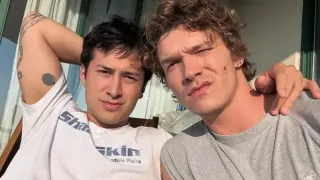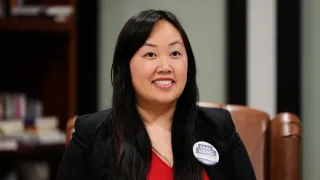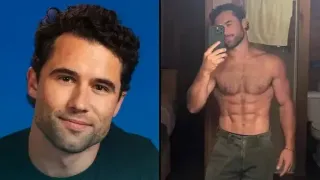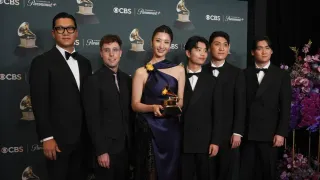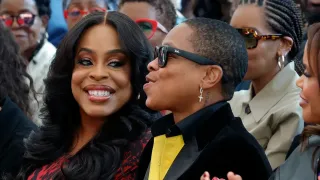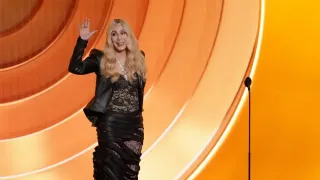May 20, 2025
'The History of Sound' Director Oliver Hermanus on Big-Screen Queer Love: 'The Cat's Out of the Bag'
Kilian Melloy READ TIME: 3 MIN.
Fans have been salivating for "The History of Sound" ever since casting news broke that the historical queer romance would pair audience favorites Paul Mescal and Josh O'Connor. Now out director Oliver Hermanus ("Moffie"), who is premiering the flick at Cannes, reassures audiences that the movie won't be coy about gay sex scenes; indeed, he points out that, at this point, there's no putting the queer genie back in the cinematic bottle.
Based on short stories by Ben Shattuck – who also wrote the screenplay – the film stars Mescal and O'Connor as a pair of lovers who first meet at conservatory even as World War I looms. They reconnect years later, as they travel through rural Maine to record American folk songs.
Both of the film's leads are straight, but each has played gay before: Mescal co-starred opposite Andrew Scott in the 2023 Andrew Haigh drama "All of Us Strangers," and O'Connor commanded international attention as a gay farmer who strikes up a same-sex love affair with a worker from Romania in Francis Lee's 2017 film "God's Own Country."
Hermanus was up-front about the film's queer sexual content, expressing skepticism about "White Lotus" creator Mike White's recent lament about gay lovemaking no longer falling outside the mainstream.
"The cat's out the bag," the South African filmmaker told Variety.
"I love films that have raw sexuality," Hermanus added; "it'll take a lot for me to be shocked or feel endangered by queer sex."
To illustrate the point, Hermanus venturing into an explicit anecdote about the Nicholas Galitzine and Julianne Moore-starring series "Mary & George," which he produced and directed episodes of. "I would turn to Nicholas Galitzine and say, 'What have you not done?'" he recounted to Variety. "He would go, 'I got fucked that way yesterday. I already did an orgy with that guy the other day. I topped that guy and bottomed for the other.'"
"The intimacy coordinator would come over with an iPad and flip through new positions," Hermanus continued, unabashedly. "It was the point where I was just trying to differentiate a French orgy from a British one, like Legos."
There's an art to steamy cinema, but there's also a commercial component, and films respond to the expectations of the times. Whereas queer-themed movies used to come wreathed in shame and secrecy even if they managed a happy ending (think of Merchant Ivory's adaptation of the E.M. Forster novel "Maurice," for instance), that sort of suffering may no longer be compelling to moviegoers who are looking for something with more nuance and passion, rather than queer misery porn.
"It's 2025, and queer audiences want more," Hermanus declared to Variety. "We've all seen a lot of tropes, especially when it comes to biopics. I'm working on one right now about Alexander McQueen. He was a gay man, HIV positive, artist, genius, living in the world of fashion with addiction, and then there's suicide."
"I remember watching 'Halston,'" Hermanus added, referencing the biographical Netflix series, produced by Ryan Murphy, about the acclaimed fashion designer, "and seeing there is a path of queer people being successful and celebrated and flying too close to the sun. They are incinerated in some tragic ending."
"I think it sticks in our heads that that our lives could potentially go down this path, when our sexuality and lifestyles have a danger or sadness to them. All the secrecy and repression," Hermanus continued. "I've made one, my film 'Beauty,'" a 2011 release about a closeted man in middle age who becomes obsessed with a younger man. "But I'd like to offer audiences something else, a different queer experience," the director added.
To that end, he designed "The History of Sound" to integrate the sexual and emotional components of the relationship portrayed by Mescal and O'Connor.
"I was very determined to not have the assumptions of sex scenes be pivotal, or gear changes in their relationship. That's not the film," Hermanus told Variety. "They stick together from the first day they meet."
"What I love is the moments that bring sex about, and then the moments after," the filmmaker continued. "Josh's character has this amazing thing where he keeps collecting all the feathers that are falling out of Paul's pillow and stuffing them back in. That's romance."
